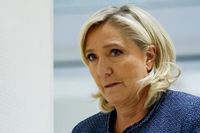In a dramatic display of support, U.S. President Donald Trump and tech mogul Elon Musk have rallied behind Marine Le Pen, the French far-right leader recently convicted of misusing European Union funds. Their backing comes amidst a controversial court ruling that has barred her from the 2027 presidential election.
On Thursday night, April 3, 2025, Trump took to his social media platform, Truth Social, declaring, "FREE MARINE LE PEN." This statement followed a Paris court's decision on March 31, 2025, which found Le Pen guilty of inappropriate use of EU funds between 2004 and 2016. The court sentenced her to four years in prison, with two years suspended and the remaining two served under house arrest with electronic monitoring. Additionally, she faces a hefty €100,000 fine and a five-year ban from holding public office.
Le Pen, the leader of the National Rally party, has long been a prominent figure in French politics, known for her staunch nationalist and anti-immigration views. Despite her legal troubles, she has remained a leading contender for France’s top job. Trump criticized the verdict, characterizing it as a politically motivated attack aimed at silencing a significant political opponent. He claimed, "She was the leading candidate. That sounds like this country. That sounds very much like this country," drawing parallels with his own legal challenges.
In a lengthy post on Truth Social, Trump continued to express his support, stating, "The Witch Hunt against Marine Le Pen is another example of European Leftists using Lawfare to silence Free Speech, and censor their Political Opponent, this time going so far as to put that Opponent in prison." He emphasized that, due to the suspension of her sentence, Le Pen would not serve time behind bars during the appeals process.
Le Pen has vehemently rejected the court's ruling, labeling it a "purely political decision" and vowing to appeal. Her lawyer indicated that the legal battle is far from over, as they plan to challenge the court's findings vigorously. In response to the ruling, Trump remarked, "Just before what would be a big victory, they get her on a minor charge that she probably knew nothing about — Sounds like a 'bookkeeping' error to me."
Trump's Vice President, JD Vance, also weighed in, stating in an interview with Newsmax, "They’re trying to throw her in prison and throw her off the ballot. Look, that’s not democracy." This sentiment resonates with many on the far-right, who view the ruling as a politically charged maneuver to undermine Le Pen's political aspirations.
Elon Musk joined the chorus of support by reposting Trump's message on X, the social media platform he owns. He added, "When the radical left can’t win via democratic vote, they abuse the legal system to jail their opponents," further fueling the narrative that the legal actions against Le Pen are part of a broader trend of political repression.
The backing for Le Pen extends beyond American shores. Prominent European right-wing figures, including Hungary’s Viktor Orbán and Dutch politician Geert Wilders, have expressed solidarity with her. This coalition of support underscores the growing influence of far-right politics across Europe, as leaders seek to align against what they perceive as a common adversary in the political establishment.
Despite the chorus of support from high-profile figures, legal experts and French officials have pointed out that the charges against Le Pen are based on substantial evidence. They argue that her defense team did not adequately dispute the main allegations of embezzlement. This raises questions about the validity of claims suggesting that the ruling was merely a politically motivated attack.
Le Pen's legal issues are not isolated; they are part of a broader pattern of challenges she has faced over the years, including accusations of hate speech and financial misconduct. Her political journey has been marked by controversy, yet she has consistently managed to maintain a significant following among voters who resonate with her nationalist rhetoric.
As the appeals process unfolds, the stakes are high for Le Pen, who has positioned herself as a champion of the French people against the perceived encroachments of the European Union and leftist ideologies. Her supporters argue that the legal challenges she faces are emblematic of a larger struggle for free speech and political expression in Europe.
In the wake of the court's ruling, Le Pen's allies are mobilizing to ensure that her voice remains prominent in the political discourse. They argue that her conviction and subsequent barring from the election are attempts to stifle dissenting voices in a landscape increasingly dominated by left-leaning narratives.
As the political climate in France continues to evolve, the implications of Le Pen's legal battles will be closely watched, not just in France but across Europe. With the support of influential figures like Trump and Musk, Le Pen's plight has garnered international attention, potentially reshaping the narrative surrounding her political ambitions.
In a world where political tensions are running high, the intersection of law and politics remains a contentious arena. The outcome of Le Pen's appeal could set a significant precedent for future political candidates facing similar legal challenges. As supporters rally around her, the question remains: will Le Pen emerge from this legal quagmire stronger, or will the weight of her convictions ultimately prove too heavy to bear?





